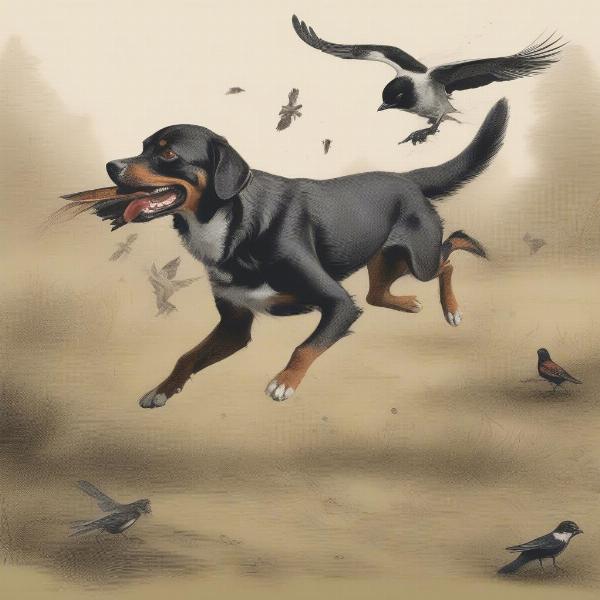My dog ate a bird alive. This can be a disturbing experience for any pet owner. Discovering your canine companion has indulged in this primal act can raise concerns about their health, behavior, and overall well-being. This article will address those concerns, providing practical advice and guidance for dog owners who find themselves in this unsettling situation. We’ll explore the reasons behind this behavior, potential health risks, and what steps to take next.
Why Do Dogs Eat Birds?
Dogs, even domesticated ones, retain instincts inherited from their wild ancestors. Prey drive is a strong motivator for many breeds, triggering the chase and capture response. Birds, small and quick, often become unfortunate targets. Sometimes, this drive goes beyond simply catching the bird; the instinct to consume the prey can also kick in.
 Dog Eating Bird – Prey Drive
Dog Eating Bird – Prey Drive
Is it Normal Behavior?
While unsettling to witness, this behavior isn’t necessarily abnormal. Many dogs, especially those with strong hunting instincts, will chase and occasionally catch small animals. However, consistent and frequent bird-eating can indicate a need for behavioral modification.
Health Risks Associated with Eating Birds
A primary concern when a dog eats a bird is the potential for contracting diseases or parasites. Birds can carry various pathogens, including Salmonella and avian influenza. Parasites, such as worms, are also a risk.
What Diseases Can My Dog Get from Eating Birds?
- Salmonella: This bacterial infection can cause gastrointestinal upset in dogs, including vomiting and diarrhea.
- Avian Influenza: While less common, dogs can contract avian influenza, also known as bird flu. Symptoms can range from mild respiratory issues to severe illness.
- Parasites: Various internal and external parasites can be transmitted from birds to dogs.
What Should I Do If My Dog Eats a Bird?
If your dog has eaten a bird, monitor them closely for any signs of illness, such as vomiting, diarrhea, lethargy, or changes in appetite. Contact your veterinarian immediately if you notice any unusual symptoms.
Immediate Steps to Take:
- Observe your dog: Watch for any changes in behavior or signs of distress.
- Contact your veterinarian: Inform them of the incident and ask for advice based on your dog’s specific situation and health history.
- Prevent future occurrences: Work on recall training and consider using a leash in areas with high bird populations.
Preventing Bird Consumption
Training and management are key to preventing your dog from eating birds. Reinforcing recall commands, using a leash in areas where birds are prevalent, and providing alternative outlets for their prey drive, such as interactive toys, can be effective.
Conclusion
Witnessing your dog eat a bird alive can be distressing, but understanding the underlying causes and potential risks can help you address the situation appropriately. While often driven by instinct, it’s crucial to monitor your dog’s health, consult your vet when necessary, and take proactive steps to prevent future incidents. By implementing appropriate training and management techniques, you can ensure your furry friend remains healthy and safe while still enjoying their natural instincts in a controlled manner. Remember, vigilance and proactive training are key to responsible pet ownership.
FAQ
- Is it safe for my dog to eat birds? No, eating birds can expose your dog to harmful bacteria, viruses, and parasites.
- What are the signs of illness after a dog eats a bird? Vomiting, diarrhea, lethargy, and changes in appetite can be signs of illness.
- How can I prevent my dog from eating birds? Reinforce recall training, use a leash in bird-populated areas, and provide alternative outlets for their prey drive.
- Should I punish my dog for eating a bird? Punishment is unlikely to be effective and can damage your relationship with your dog. Focus on positive reinforcement training instead.
- What should I do if my dog shows signs of illness after eating a bird? Contact your veterinarian immediately.
- Can birds transmit diseases to humans through dogs? While less common, some diseases can be transmitted indirectly. Always practice good hygiene after handling your dog.
- Are certain dog breeds more prone to eating birds? Breeds with strong hunting instincts, such as terriers and hounds, are often more inclined to chase and catch small animals.
Related Articles on ILM Dog
ILM Dog is your trusted resource for expert dog care advice and guidance. We offer valuable information on dog breeds, health, training, nutrition, grooming, and more. We understand the special bond between humans and their canine companions, and we strive to provide comprehensive resources to support that relationship. Whether you’re looking for tips on training, breed-specific information, or advice on health and nutrition, ILM Dog is here to help. Contact us today at [email protected] or +44 20-3965-8624 to learn more.